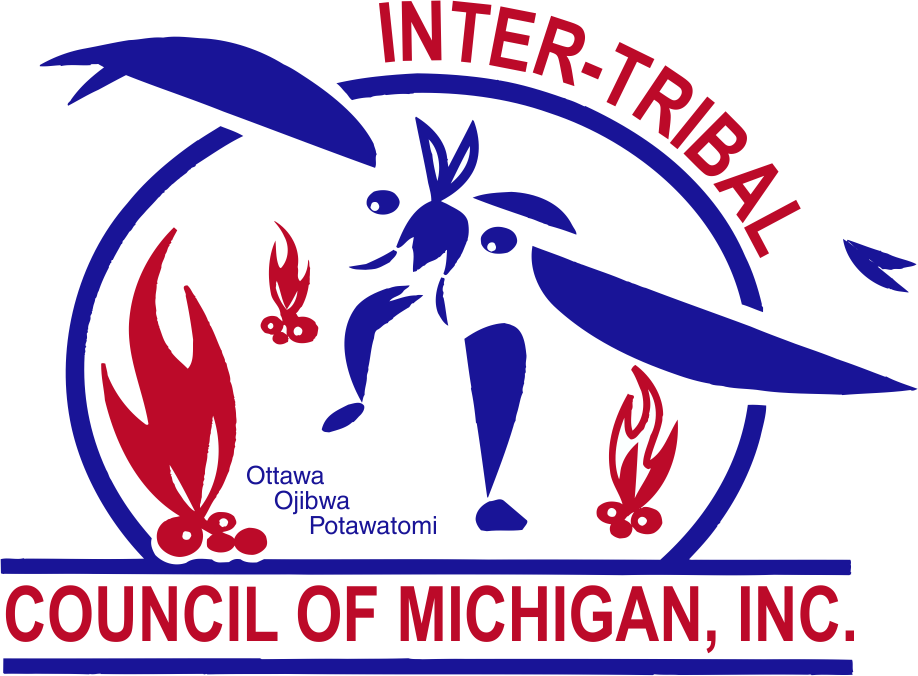Category: Maternal & Childhood Resource
Maternal & Childhood Resource
Living Stories and Seasonal Reflections from Gichigami

About
The exhibit centers on the relationships the Anishinaabek have with food since a time beyond memory on Mikinaakminising or Turtle Island. In the Anishinaabe worldview, Mikinaakminising makes reference to the American continent. The shell of the turtle (mikinaak) represents the land we live in and highlights the 13 moons of the Anishinaabe lunar calendar. These moons are symbolized through the shell with 13 center plate-sections representing each moon and 28 outer plate-sections representing the days.
The exhibit is organized by season. Ziigwan (spring) focuses on reclaiming sugar bushing (tapping maple trees) to make maple syrup. Niibin (summer) focuses on taking care of our relationship with nibi (water), mshkiki (medicines), and aki (land) during this time and through all the seasons. Daagwagin (fall) focuses on preserving intergenerational knowledge. Biboon (winter) highlights fulfilling our reciprocal responsibilities affirmed in our hunting, fishing, and other treaty rights.
As you move through each season, stories are shared of how our relationship with food from Shkaakamikwe (Mother Earth) and nibi (water) connects us to our ancestors and descendants. The reciprocal nourishment between the Anishinaabek and Shkaakamikwe is underscored with struggles to preserve and restore food sovereignty and exercise treaty rights.
Our team:
Jessica Barnes, Najor Rick Burnett III, Ann Cameron, Michelle Cypher, Danielle Gartner, Cheyenne Hopps, Heather Howard, Michele Koppinger, Patrick Koval, Maeve Kuhlman, Michelle Leask, Lisa Martin, Eva Oldman, Amanda Rinna, Jessica Saucedo, Rosebud Schneider, Beedoskah Stonefish, Chelsea Wentworth
Training Videos

Home Visitor Safety
Gikinawaabi Training
LOLLIPOP Training
Maternal & Childhood Resource
Traditional Teachings Resources
The focus of these resources is geared towards expecting families, newborns, and early childhood.

Maternal & Childhood Resource
Perinatal & Mental Health

U.P. Community Resources
Maternal & Childhood Resource
Here families, individuals, home visitors, and community organizations will find helpful tools, information, and resources to help answer questions, find resources, training, share documents, and find community partners.

Maternal & Childhood Resource
Substance Use Disorders

Programs & Resources
No posts found!
About Healthy Start
Healthy Start is a national infant mortality prevention initiative funded by the U.S. Department of Health and Human Services, Health Resources and Services Administration, Maternal and Child Health Bureau. Our project is one of about 100 federally-funded projects around the country, and includes 10 sites: Bay Mills Indian Community, Grand Traverse Band of Ottawa and Chippewa Indians, Hannahville Indian Community, Keweenaw Bay Indian Community, Little Traverse Bay Bands, Nottawaseppi Huron Band of Potawatomi, Pokagon Band of Potawatomi Indians, Saginaw Chippewa Tribe, Sault Tribe of Chippewa Indians,and American Indian Health & Family Services of Southeast Michigan. Healthy Start focuses on access to and use of health services for women and their families, strengthening local health systems and increasing consumer input into these systems of local care. Each year, we provide personalized, supportive case management to between 600 and 700 people, and community outreach and education services to over 4,000 people in 14 counties in Michigan.
Core Strategies: Healthy Start features evidence-based practices and innovative, culturally informed community-driven interventions. Beginning with direct outreach by community health workers to pregnant and postpartum women, we ensure that mothers and infants have ongoing sources of primary and preventive health care and that their basic needs (housing, psychosocial, nutritional and educational support) are met. Following risk assessments and screening for perinatal depression, case managers provide linkages with appropriate services and education. Most services are delivered through home visiting. Mothers and infants are followed from entry into prenatal care through 2 years after delivery. The project has strong collaborative linkages with State programs including Title V MCH Block Grant, Medicaid, State Child Health Insurance Program, and with local agencies and services.
Success: Since the introduction of Healthy Start in 1997, we have seen a steady downward trend in American Indian infant mortality within the project area, with the disparity gap narrowing between White and American Indian infants. Other trends include a marked increase in first trimester prenatal care, lower prematurity rates, an increase in those securing a medical home, increased screening for pregnancy and postpartum health risks, and increased use of culturally competent elements in policies, guidelines and trainings.
Maternal & Childhood Resource
Substance Use Disorders

Programs & Resources
No posts found!
About Healthy Start
Healthy Start is a national infant mortality prevention initiative funded by the U.S. Department of Health and Human Services, Health Resources and Services Administration, Maternal and Child Health Bureau. Our project is one of about 100 federally-funded projects around the country, and includes 10 sites: Bay Mills Indian Community, Grand Traverse Band of Ottawa and Chippewa Indians, Hannahville Indian Community, Keweenaw Bay Indian Community, Little Traverse Bay Bands, Nottawaseppi Huron Band of Potawatomi, Pokagon Band of Potawatomi Indians, Saginaw Chippewa Tribe, Sault Tribe of Chippewa Indians,and American Indian Health & Family Services of Southeast Michigan. Healthy Start focuses on access to and use of health services for women and their families, strengthening local health systems and increasing consumer input into these systems of local care. Each year, we provide personalized, supportive case management to between 600 and 700 people, and community outreach and education services to over 4,000 people in 14 counties in Michigan.
Core Strategies: Healthy Start features evidence-based practices and innovative, culturally informed community-driven interventions. Beginning with direct outreach by community health workers to pregnant and postpartum women, we ensure that mothers and infants have ongoing sources of primary and preventive health care and that their basic needs (housing, psychosocial, nutritional and educational support) are met. Following risk assessments and screening for perinatal depression, case managers provide linkages with appropriate services and education. Most services are delivered through home visiting. Mothers and infants are followed from entry into prenatal care through 2 years after delivery. The project has strong collaborative linkages with State programs including Title V MCH Block Grant, Medicaid, State Child Health Insurance Program, and with local agencies and services.
Success: Since the introduction of Healthy Start in 1997, we have seen a steady downward trend in American Indian infant mortality within the project area, with the disparity gap narrowing between White and American Indian infants. Other trends include a marked increase in first trimester prenatal care, lower prematurity rates, an increase in those securing a medical home, increased screening for pregnancy and postpartum health risks, and increased use of culturally competent elements in policies, guidelines and trainings.
Videos

Programs & Resources
No posts found!
About Healthy Start
Healthy Start is a national infant mortality prevention initiative funded by the U.S. Department of Health and Human Services, Health Resources and Services Administration, Maternal and Child Health Bureau. Our project is one of about 100 federally-funded projects around the country, and includes 10 sites: Bay Mills Indian Community, Grand Traverse Band of Ottawa and Chippewa Indians, Hannahville Indian Community, Keweenaw Bay Indian Community, Little Traverse Bay Bands, Nottawaseppi Huron Band of Potawatomi, Pokagon Band of Potawatomi Indians, Saginaw Chippewa Tribe, Sault Tribe of Chippewa Indians,and American Indian Health & Family Services of Southeast Michigan. Healthy Start focuses on access to and use of health services for women and their families, strengthening local health systems and increasing consumer input into these systems of local care. Each year, we provide personalized, supportive case management to between 600 and 700 people, and community outreach and education services to over 4,000 people in 14 counties in Michigan.
Core Strategies: Healthy Start features evidence-based practices and innovative, culturally informed community-driven interventions. Beginning with direct outreach by community health workers to pregnant and postpartum women, we ensure that mothers and infants have ongoing sources of primary and preventive health care and that their basic needs (housing, psychosocial, nutritional and educational support) are met. Following risk assessments and screening for perinatal depression, case managers provide linkages with appropriate services and education. Most services are delivered through home visiting. Mothers and infants are followed from entry into prenatal care through 2 years after delivery. The project has strong collaborative linkages with State programs including Title V MCH Block Grant, Medicaid, State Child Health Insurance Program, and with local agencies and services.
Success: Since the introduction of Healthy Start in 1997, we have seen a steady downward trend in American Indian infant mortality within the project area, with the disparity gap narrowing between White and American Indian infants. Other trends include a marked increase in first trimester prenatal care, lower prematurity rates, an increase in those securing a medical home, increased screening for pregnancy and postpartum health risks, and increased use of culturally competent elements in policies, guidelines and trainings.
Community Resources

Programs & Resources
No posts found!
About Healthy Start
Healthy Start is a national infant mortality prevention initiative funded by the U.S. Department of Health and Human Services, Health Resources and Services Administration, Maternal and Child Health Bureau. Our project is one of about 100 federally-funded projects around the country, and includes 10 sites: Bay Mills Indian Community, Grand Traverse Band of Ottawa and Chippewa Indians, Hannahville Indian Community, Keweenaw Bay Indian Community, Little Traverse Bay Bands, Nottawaseppi Huron Band of Potawatomi, Pokagon Band of Potawatomi Indians, Saginaw Chippewa Tribe, Sault Tribe of Chippewa Indians,and American Indian Health & Family Services of Southeast Michigan. Healthy Start focuses on access to and use of health services for women and their families, strengthening local health systems and increasing consumer input into these systems of local care. Each year, we provide personalized, supportive case management to between 600 and 700 people, and community outreach and education services to over 4,000 people in 14 counties in Michigan.
Core Strategies: Healthy Start features evidence-based practices and innovative, culturally informed community-driven interventions. Beginning with direct outreach by community health workers to pregnant and postpartum women, we ensure that mothers and infants have ongoing sources of primary and preventive health care and that their basic needs (housing, psychosocial, nutritional and educational support) are met. Following risk assessments and screening for perinatal depression, case managers provide linkages with appropriate services and education. Most services are delivered through home visiting. Mothers and infants are followed from entry into prenatal care through 2 years after delivery. The project has strong collaborative linkages with State programs including Title V MCH Block Grant, Medicaid, State Child Health Insurance Program, and with local agencies and services.
Success: Since the introduction of Healthy Start in 1997, we have seen a steady downward trend in American Indian infant mortality within the project area, with the disparity gap narrowing between White and American Indian infants. Other trends include a marked increase in first trimester prenatal care, lower prematurity rates, an increase in those securing a medical home, increased screening for pregnancy and postpartum health risks, and increased use of culturally competent elements in policies, guidelines and trainings.
Maternal & Childhood Resource
Pre-term Birth Resources

2016 Premature Birth Report Card
Powered By EmbedPress
Racial & Ethnic Disparities in Birth Outcomes
Powered By EmbedPress
Racial & Ethnic Disparities in Preterm Birth Among American Indian and Alaska Native Women
Powered By EmbedPress
